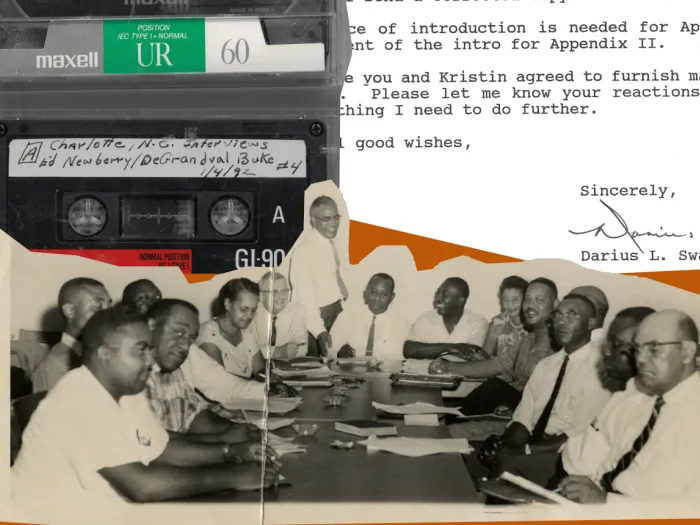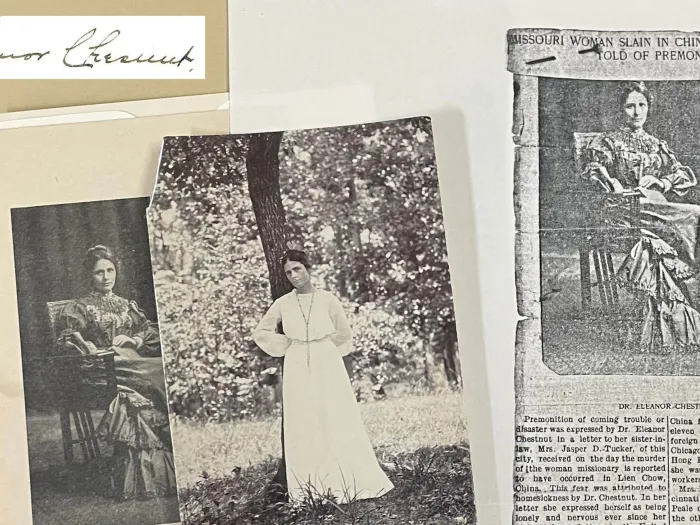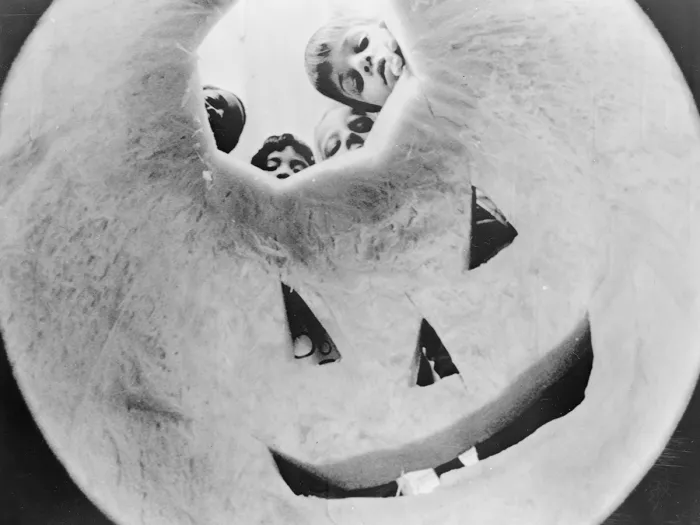Each month, the Presbyterian Historical Society is diving deep into the archives and sharing stories from the family and personal papers in our collections. This month, we’re highlighting the Anna B. Criswell Papers.
What better way to celebrate Women’s History Month than by exploring an archival collection that illustrates the life of a woman dedicated to her church, her pupils, her family, and her own happiness?
Record Group 184 is made up of the personal papers of one Anna B. Criswell (1880-1953). The collection fills a single Banker’s Box and is chock full of letters, photographs, newspaper clippings, and the like. Through this plethora of paper ephemera, we are introduced to Ms. Criswell—who, at the age of twenty-five, traveled from Iowa all the way to the American Mission in Egypt, and began work at the Pressly Memorial Institute (PMI), a girls’ school in Assiut, where she would remain for over four decades.
In a handwritten document titled “45 Years in Egypt,” dated only with the year—1950, the year she would retire from mission service—Anna “looks back over a lifetime spent in Egypt.” She concludes the recollection of her time at PMI by offering her “testimony to the young women of the church”—If they want to find a life full of adventure and packed with soul satisfying experiences choose the mission field.
Who was Anna B. Criswell?
I gleaned most of the biographical information about Anna from two documents—both are undated tributes to Ms. Criswell, penned by two of her acquaintances from the Institute after she passed away. This information, paired with the letters she sent, the photos she kept, and the diaries she wrote come together to paint a more complete picture of who she was.
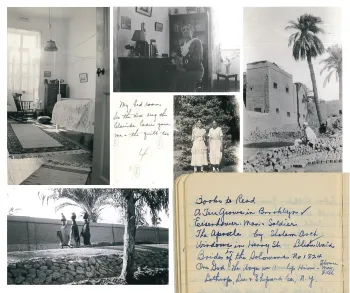
Photographs and a page from Anna B. Criswell's diary, from RG184. The smaller photo in the middle shows Anna (left) standing with her sister, Viola (right).
Anna B. Criswell was born on Christmas Day of 1880, near Yale, Iowa—but she didn’t stay among the cornfields for long. Appointed to the mission field by the United Presbyterian Church of North America in 1905, Criswell ventured to the church’s Egypt Mission in the early years of the new century. She served in Egypt for four and a half decades, her primary duties revolving around PMI, where she also acted as principal for twenty-five years. Halfway through the twentieth century, in 1950, Anna retired from active missionary service.
In her tribute to her late friend, Mary L. Thompson writes that Anna’s “wise counsel was respected in the varied affairs of the Mission. While she lived and worked in Assiut, she was always interested in the work of her friends in other places and her advice was appreciated in helping to solve their problems.” It sounds like Anna was a problem-solver, a dedicated advisee, an offeror of encouragement and hope to all she met. She was also, apparently, the perfect vacation buddy. “The secret of her ability to create a happy atmosphere in whatever group she was is to be found in the testimony of a friend who said, ‘She was the best Christian I ever knew.’”
The Pressly Memorial Institute
Thompson's tribute to Criswell provided evidence of the influence she had on the students of the girls' school in Assiut. Thompson shared, “Frequently since her retirement in 1950 when former pupils have inquired about Miss Criswell, they have said with pride, ‘She was my friend.’” (A teacher who took me for picnics along the Nile would be my favorite, too).
When she first arrived in Assiut, Anna started as a teacher at the Pressly Memorial Institute. She remained there from 1906 through 1950—which was both the year she retired from mission service, and the Institute’s 50th anniversary.
In honor of her workplace’s golden jubilee celebration, Anna penned a brief history of the Institute in one of her diaries. It’s dated March 3, and begins a recollection: “Few present when I came to PMI in 1906 – Miss Katy a teacher and Miss Almaz (?) a pupil.” She goes on to share more details, including statistics, what the girls’ learned, and more.
PMI opened in 1874 with 11 girls enrolled. The number kept growing until 1900, there were 194 boards and 50 “day girls.” By 1950, those numbers were 520 and 95. Anna’s comment on this increase is a single word: “Growth.”
Through her collection, we learn that PMI offered teacher’s training, organized a Volunteer Board in 1912, established a girl scout/Girl Guide program in 1929, and so much more. “But tho the P.M.I. has grown,” Anna writes, “it is the same. The same spirit exists in the school; the same loyalty is shown by those who go out from the school; the same emphasis placed on character training, the same ideals of service are held before the girls.”
Learning from her Letters
“This is Saturday evening and there is such a chatter of voices outside the office door that I can hardly think. A boarding school is a busy place and sometimes one wishes for quiet, but it’s nice to be living in the midst of a lot of girls. We certainly have a nice lot of them this year. The teachers too are all so happy + work together so well. Alas! it wasn’t always so and we appreciate the blessing all the more because we know what its absence means. I counted the roll today and we have 33 girls in all and 100 boarders.”
-Dec 2 [1921], correspondence addressed to Viola
During her time in Egypt, Anna frequently corresponded with her family. In one such letter, dated August 27, 1921, Anna mentions how they “are standing the heat fine. It is about 105 in the shade every day and I put the thermometer in the sun one day and in no time it had reached 120.”
Less than a month later, in correspondence addressed to her father, Anna talks of the school year. “We have over 50 girls now and more to come. Five nice children had to be turned away Friday as the classes would not hold more. There are over thirty in the first, second, and third years as well as in the five classes in the beginners dept. The govenor (sp) of Assiut sent word that he wants special English and music lessons for his two daughters and we will have to provide them whether we can conveniently do so or not. His wish is law.”
The following line elicited a laugh from me as I read it. Anna flits back and forth between talk of her work and nods toward the familial news offered to her in her parents’ and sister’s letters. She congratulates him on his dental health, saying that “I hope your new teeth work well when you get them put in. You certainly needed more than three to eat with.”
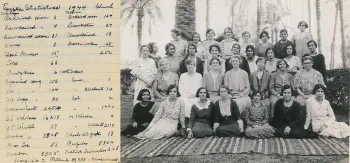
Left: page from Anna's diary, "Egyptian Statistics 1944). Right: PMI faculty.
There are several diaries that live within Criswell’s archival collection as well. Of course, there are personal things we can learn from them—a list of books Anna hoped to read had a checkmark next to A Tree Grows in Brooklyn—but the diaries also include notes about PMI, her work, her social life, and more. In one entry, Anna scrawled the above page, titled “Egyptian Statistics 1944.” She divided her data into two categories—foreign and native—and the numbers she penned offer us insight into the work of the American Mission in Egypt in the mid-twentieth century. As of 1944, there were six presbyteries, 156 organized congregations, 16,218 Sunday School scholars, 2 hospitals with over 30,000 patients; over 160 native men had been ordained, and, overall, over 250 native people worked with them at the mission.
Glimpses of Life, Through a Lens
The last chunk of folders that make up our collection of Anna Criswell’s personal papers is a treasure trove of old photographs. These images offer a closer look into Anna’s life at the American Mission in Egypt in the early- to mid-twentieth century.
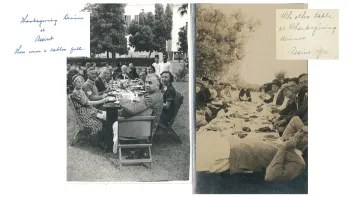
Images from RG184. Left reads: Thanksgiving Dinner at Assiut. There were six tables full. Right reads: The other table at Thanksgiving dinner. Assiut 1915.
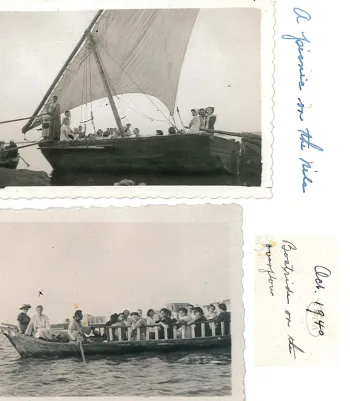
Image from RG184. Top reads: A picnic on the Nile. Bottom reads: Oct. 1940 Boatride on the overflow. 4
It is in Mary L. Thompson's tribute that we learn of Anna’s decline. Though the illness Anna suffered with goes unnamed, there is quite a bit to be said regarding the bad health that led to her passing.
A gloom fell over our entire school family when word came just before Christmas of Miss Criswell’s serious illness. Thoughtfully she arranged to have her sister send a cable which reached us the day before Christmas. She herself wrote on January 6th and spoke hopefully of her condition. So the news of her passing at the close of the day on January 25th came with added shock. It is a comfort to know that she has been spared years of physical disability….It is good to have known such a one.
Thanks to a note by Mary that it had been two and a half years since Anna left Egypt, we can deduce that Anna died in January 1953.
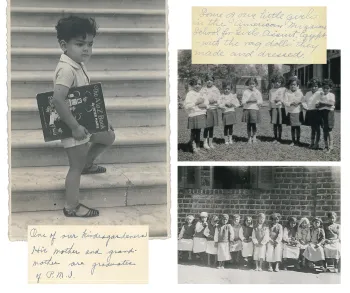
Images from RG184. Bottom left caption reads: One of our kindergardeners. His mother and grand-mother are gradutes of P.M.I. Top right caption reads: Some of our little girls in the American Mission School for Girls, Assiut, Egypt - with the rag dolls they made and dressed.
The second tribute, penned by Frances Pfander on June 11, 1953, corroborates this deduction in its first line. “Anna Belle Criswell was born near Yale, Iowa, on December 25, 1880, and died in the Clarinda, Iowa, Municipal Hospital on January 25, 1953.” We quickly learn that Frances was a friend of Anna’s from her youth and work in Iowa, prior to her service in Egypt. Frances’s words point toward the genuineness of Anna’s character: “I only remember with joy my privilege of being in the large circle of her friendship which knew no bounds of age, sex, religion, or geography. We at Clarinda remained in her thoughts when she was in Egypt and when she returned to us she maintained a vital interest in her friends in Egypt and elsewhere in the mission fields. The signature on her letters, ‘Your loving friend,’ was genuine…Certainly one of God’s best gifts is a true friend and no one ever had a truer friend than Miss Anna.”
Her collection, though small, is evidence of a life well lived, of a woman who traveled far and wide and was a friend to all she met, of a heart dedicated to the happiness of those around her and herself, of a passion for service. This Women’s History Month, may we all learn from Anna Criswell’s genuine spirit, and look at every stranger as though they are already a friend.
You may freely reuse and distribute this article in its entirety for non-commercial purposes in any medium. Please include author attribution, photography credits, and a link to the original article. This work is licensed under a Creative Commons Attribution-NonCommercial-NoDeratives 4.0 International License.

